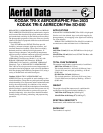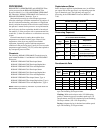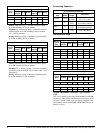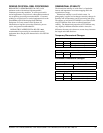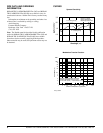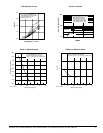
KODAK TRI-X AEROGRAPHIC Film 2403 KODAK TRI-X AERECON Film SO-050 • AS-24 5
REWIND OR SPIRAL REEL PROCESSING
KODAK TRI-X AEROGRAPHIC Film 2403 yields
optimum results with modern, high-temperature,
continuous-processing machines. It can be processed in
rewind equipment or on spiral reels, although these methods
are not primary processing recommendations. Customers
wishing to use spiral reels or rewind equipment such as the
Gordon/Morse M-10 Developing Outfit (Military
Designator: B-5) may contact Aerial Systems for
information on exposure, processing chemicals, process
cycles, and general recommendations.
KODAK TRI-X AERECON Film SO-050 is not
recommended for processing in conventional rewind
equipment due to the physical characteristics of its ESTAR
Thin Base.
DIMENSIONAL STABILITY
The dimensional stability of aerial films is of particular
interest and importance in accurate mapping and in the
reproduction of maps.
Dimensional stability is an all-inclusive term. In
photography, it applies to size changes caused by changes in
humidity and in temperature, and by processing and aging.
The absence of solvent in ESTAR Base is one of the reasons
why ESTAR Base films show excellent dimensional
stability. The dimensional properties of ESTAR Base may
vary slightly in different directions within a sheet; the
differences that may exist, however, are not always between
the length and width directions.
Temporary Dimensional Changes
Permanent Dimensional Changes
Thermal Coefficient of Linear Expansion:
2403 SO-050
0.001% 0.001% per degree F of change
0.0018% 0.0018% per degree C of change
Humidity Coefficient of Linear Expansion (Unprocessed):
2403 SO-050
0.002% 0.0035% per 1% change in relative humidity
Processing Dimensional Change (Shrinkage to Swell):
2403 SO-050
-0.04% to +0.03% -0.04% to +0.03%
Aging Shrinkage of Processed Film:
2405 SO-050
0.05% 0.08% 1 week at 120°F (49°C), 20% RH
0.03% 0.04% 1 year at 78°F (25.5°C), 60% RH



